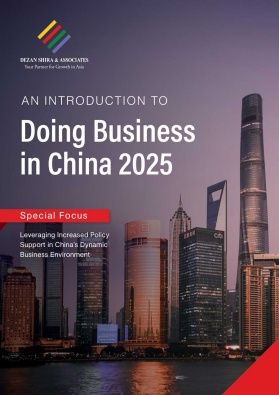Beijing New Market Access Updates: Opportunities for Foreign Businesses and Investors
Beijing has announced new market access updates, signaling China’s significant opening of its economy to foreign investment across multiple sectors, including services such as healthcare and telecommunications. These changes are aimed at driving growth and enhancing global integration. The updates include revised regulations, pilot programs, and an improved business environment, offering fresh opportunities for foreign businesses to engage in China’s development.
On January 8, 2025, China’s State Council issued a formal Reply approving temporary adjustments to the implementation of specific administrative regulations and departmental rules in Beijing. These adjustments, aligned with the city’s role in the Comprehensive Pilot Demonstration Zone for Expanding Opening-Up in the Services Sector, reflect Beijing’s continued efforts to deepen reforms and attract foreign investment.
The adjustments encompass several key areas:
- Vocational training: Foreign investors are now allowed to establish wholly foreign-owned vocational skills training institutions, enhancing opportunities in the education sector.
- Entertainment sector: Revisions to the regulations governing entertainment venues and commercial performances aim to attract more foreign participation and innovation.
- Telecommunication services: Restrictions on foreign equity in value-added telecommunication services, such as app stores and internet access, have been relaxed, excluding areas where foreign investment is prohibited.
- Cell therapy and pharmaceutical R&D: New measures explore equity incentive mechanisms for foreign and Hong Kong, Macao, and Taiwan professionals engaged in cutting-edge fields like stem cell and gene research.
The adjustments not only build on prior opening-up initiatives but also signify Beijing’s ambition to enhance its regulatory and operational framework to match global standards.
This article delves into the implications of these updates, focusing on their potential to reshape vocational training, entertainment, telecommunications, and cell therapy industries, while reinforcing Beijing’s position as a pioneer in China’s broader opening-up strategy.
Overview of Beijing’s market access updates
Below we present the key regulatory adjustments in Beijing, effective from January 2025, which impact various sectors. These changes aim to open up markets for foreign investment and participation, allowing greater international involvement across vocational training, entertainment, telecommunications, and pharmaceutical R&D. The updates also reflect Beijing government’s broader strategy of enhancing economic openness and fostering innovation in critical industries.
| Sector | Existing Regulations | Adjustments and Impacts |
| Vocational training | According to Article 62 of the Regulations on Chinese-Foreign Cooperation in Running Schools, foreign educational institutions, organisations, or individuals were prohibited from establishing separate schools or educational institutions where Chinese citizens were the main recruiters. | The new policy now allows wholly foreign-owned enterprises to establish commercial vocational skills training institutions in Beijing. This shift opens up the vocational training sector to international expertise and investment. |
| Entertainment sector | The Regulations on the Administration of Entertainment Venues and the Regulations on the Administration of Commercial Performances previously imposed restrictions on foreign participation in these sectors, limiting foreign investment and control. | The new adjustments relax these restrictions, allowing for increased foreign involvement in entertainment-related services. Foreign investors can now have a greater stake in entertainment venues and performances, leading to more opportunities for international collaboration and content innovation. |
| Telecommunication services | Under the Special Administrative Measures for the Access of Foreign Investment (Negative List) (2024 Edition), foreign ownership was previously limited in value-added telecommunication services, such as app stores and internet services, with specific restrictions in place regarding foreign equity ratios. | The new adjustments remove the foreign equity ratio restrictions in areas such as app stores and internet access services, allowing foreign investors to hold a larger stake in these value-added services. However, restrictions remain in sectors deemed sensitive or prohibited for foreign investment. |
| Stem cells and gene therapy R&D | Foreign investment in the R&D development of stem cells and gene therapies was previously constrained, particularly in areas involving equity participation from foreign, Hong Kong, Macao, and Taiwan professionals. | The new adjustments introduce equity incentives for foreign professionals in the fields of stem cells and gene research. This policy change encourages greater international involvement in pharmaceutical R&D in Beijing, potentially accelerating innovation in these high-tech sectors. |
Implications of the new updates
These regulatory adjustments represent a continuation of Beijing’s broader efforts to gradually open up key sectors to foreign investment. While some of the latest changes mark an expansion of foreign access, they build upon earlier policy shifts rather than introducing entirely new opportunities.
For instance, wholly foreign-owned vocational skills training institutions have been permitted in Beijing since at least 2021/2022. The current adjustments reinforce this trend, reflecting ongoing efforts to align China’s vocational education system with international standards and workforce demands. The expansion of foreign participation in this sector is likely to attract further investment in educational infrastructure and training programmes, supporting China’s broader goals of workforce upskilling and economic competitiveness.
Similarly, the relaxation of foreign investment restrictions in the telecommunications sector follows previous liberalisation efforts in other cities. The removal of equity limits on app stores and internet access services is part of China’s broader strategy to modernise its digital infrastructure while maintaining regulatory oversight. These updates are expected to encourage greater foreign participation, particularly in areas such as e-commerce, mobile applications, and digital services, fostering competition and technological advancement.
In the entertainment industry, easing restrictions on foreign involvement in venues and performances reflects a steady loosening of investment barriers rather than a sudden shift. As China continues to integrate international expertise and capital into its entertainment sector, these incremental changes could encourage cross-border partnerships and greater diversity in content creation.
Meanwhile, in the biotechnology sector, the introduction of equity incentives for foreign and Hong Kong, Macao, and Taiwan professionals builds on previous measures aimed at fostering innovation in cell therapy and pharmaceutical R&D. These refinements are part of China’s broader push to enhance its competitiveness in regenerative medicine and genetic therapies through international collaboration.
Overall, these adjustments reinforce China’s ongoing commitment to refining its regulatory framework and improving market access, particularly in industries deemed crucial to long-term economic growth and innovation. While not entirely new, they signal a continued policy direction that encourages foreign participation in key sectors, making Beijing—and China more broadly—an increasingly attractive destination for strategic investment.
Recent measures to open up strategic sectors for foreign investment
China is undergoing a significant economic shift, actively opening its doors to foreign investment across a spectrum of sectors. This strategic move is driven by a desire to fuel economic growth, attract valuable foreign capital and expertise, and deepen its integration into the global marketplace. No longer solely focused on manufacturing, China is now actively courting foreign investment in areas that were once tightly controlled.
This liberalization is particularly evident in the services sector.
- Healthcare: Pilot programs are paving the way for foreign investment in cutting-edge fields like cell and gene therapy, and wholly foreign-owned hospitals are now permitted in select cities.
- Telecommunications: The sector is shedding its traditionally restrictive stance, with relaxed ownership limits for value-added services, allowing foreign companies to establish wholly-owned businesses in designated zones.
- Other services: China is easing regulations to facilitate greater market access for foreign entities in areas like travel and tourism, entertainment, and commercial performances.
Beyond services, China’s commitment to opening-up is reflected in its complete removal of restrictions on foreign investment in the manufacturing sector. This bold move grants foreign investors national treatment, signifying a major step towards full liberalization of this critical economic pillar. To further accelerate this opening-up, China is implementing pilot programs in specific cities and free trade zones. These programs serve as testing grounds for new policies and allow for a gradual, controlled implementation of reforms before they are rolled out nationwide.
Opportunities for businesses and investors
China’s recent policy adjustments send a clear signal to foreign businesses: opportunities abound for those ready to engage with the evolving Chinese market. These reforms, particularly within the services sector, pave the way for increased foreign participation and success.
Healthcare is ripe for investment, with pilot programs welcoming foreign capital for cell and gene therapy research and the potential for wholly foreign-owned hospitals in select cities. This allows for the introduction of new care models and management expertise to the Chinese healthcare system.
In telecommunications, relaxed ownership limits for value-added services empower foreign companies to gain a stronger foothold in areas like app stores and internet services. This fosters innovation and competition, benefiting both businesses and consumers through advancements in e-commerce, mobile apps, and internet services.
The education sector presents opportunities for foreign-owned vocational training institutions to address China’s growing demand for skilled labor, contributing to workforce development and economic growth.
About Us
China Briefing is one of five regional Asia Briefing publications, supported by Dezan Shira & Associates. For a complimentary subscription to China Briefing’s content products, please click here.
Dezan Shira & Associates assists foreign investors into China and has done so since 1992 through offices in Beijing, Tianjin, Dalian, Qingdao, Shanghai, Hangzhou, Ningbo, Suzhou, Guangzhou, Haikou, Zhongshan, Shenzhen, and Hong Kong. We also have offices in Vietnam, Indonesia, Singapore, United States, Germany, Italy, India, and Dubai (UAE) and partner firms assisting foreign investors in The Philippines, Malaysia, Thailand, Bangladesh, and Australia. For assistance in China, please contact the firm at china@dezshira.com or visit our website at www.dezshira.com.
- Previous Article China’s “National Unified Market” Initiative: 2025 Update
- Next Article China Robotics Industry: What Are the Opportunities for Foreign Stakeholders

























